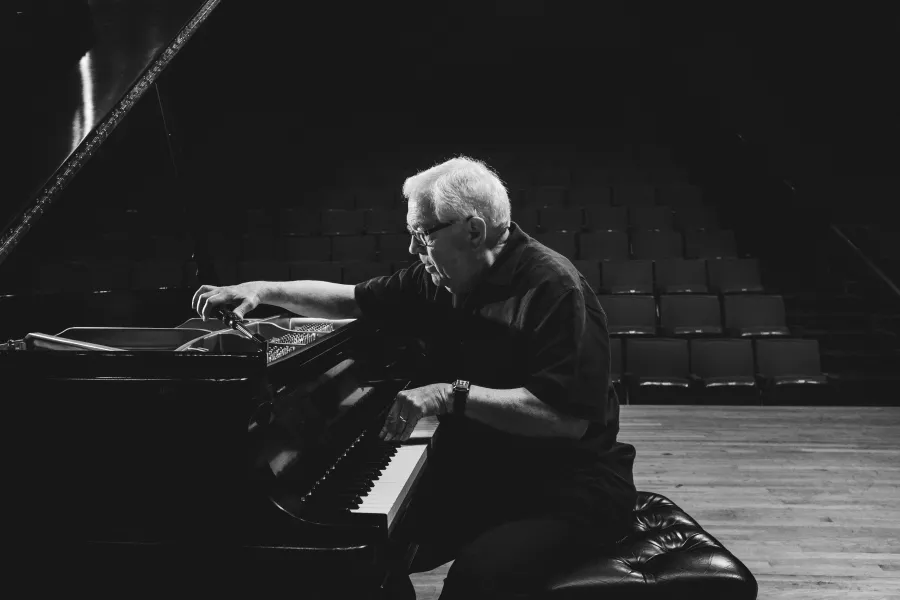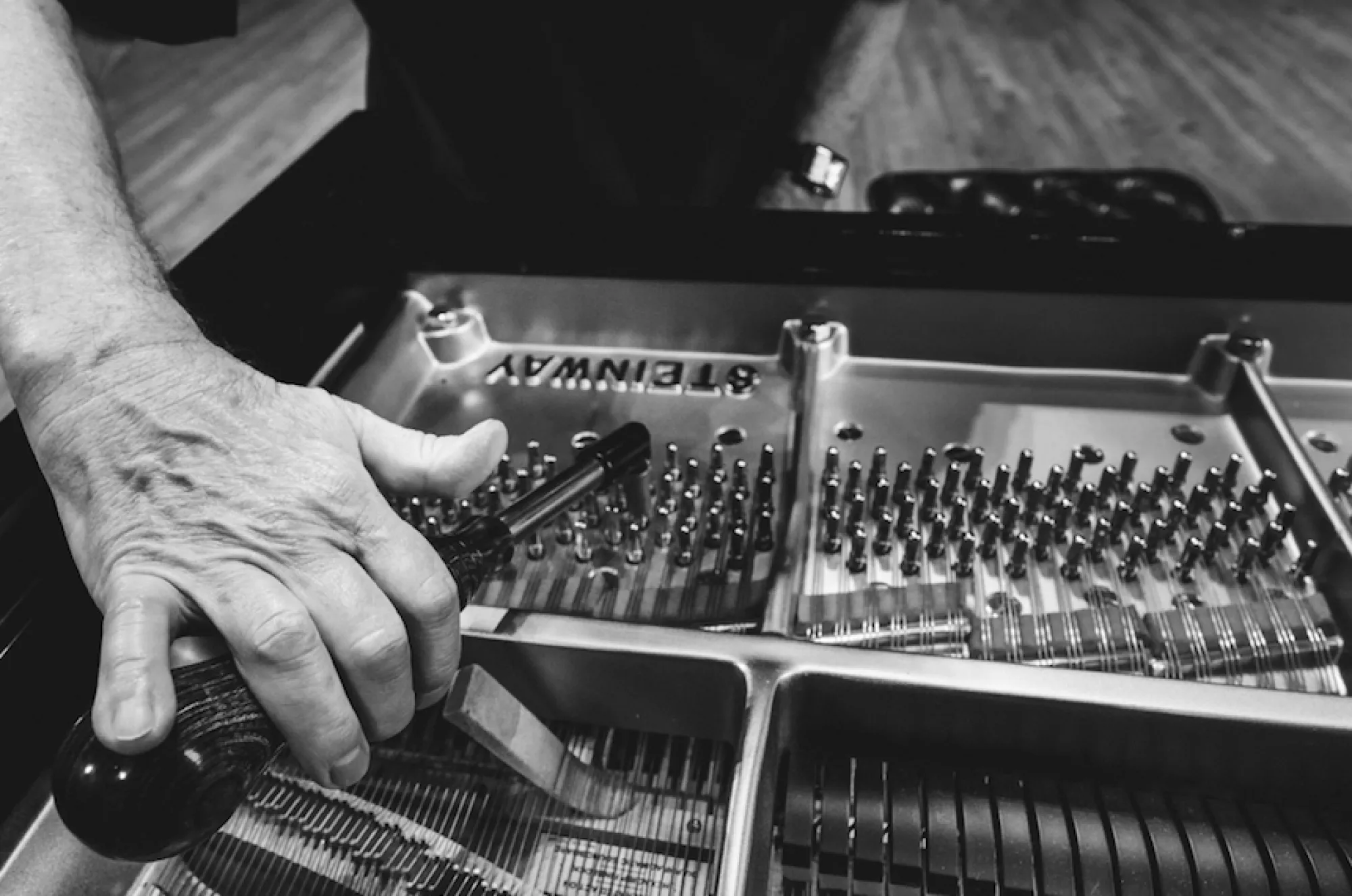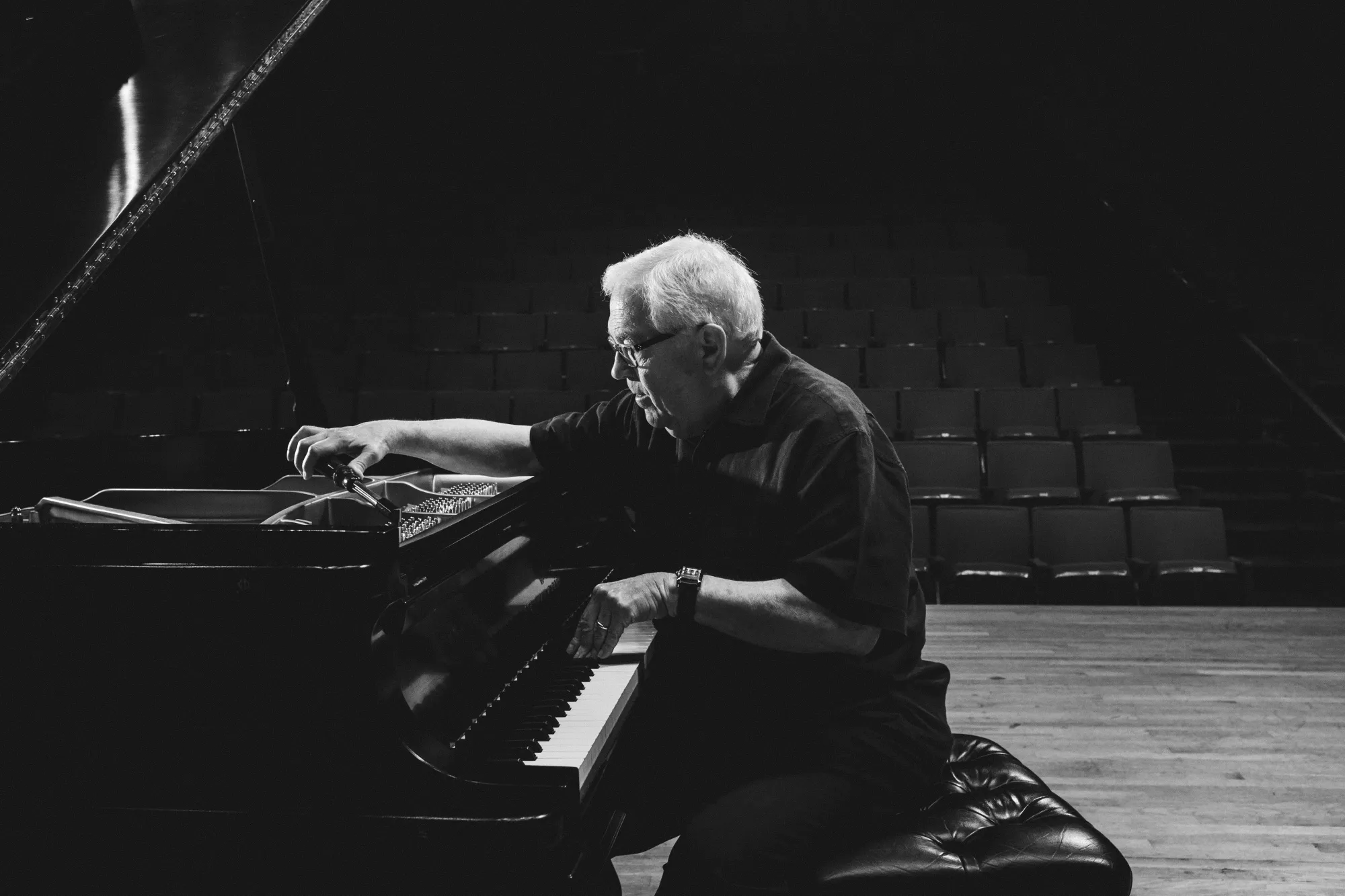October 2, 2019

Charles Ball has been the head piano technician for The University of Texas at Austin music department since 1980; he will be retiring from work at the Butler School midway through the 2019–2020 academic year.

Charles Ball in Bates Recital Hall. Photo: Nathan Russell
Jenny Catchings: How did you get into working on pianos?
Charles Ball: Oh, well my mother bought an old upright piano for me when I was a kid to take lessons and, even though I aspired to be Van Cliburn or [Vladimir] Horowitz, I didn't really have any talent. Soon, I started looking inside and fiddling with the piano. I started hanging out at the shop near my home where we had gotten the piano; they gave me some work. I was 15 or 16 at the time I started working on pianos, and I really had a sense that it was something familiar, something that I’d seen before.
That's so romantic.
Yeah, that or sort of otherworldly. Like maybe this happened in a previous life? But I just took to it, and became very interested, and have continued working on them for 54 years.
What year did you start at UT, and what was the music department like at that time?
It was a very exciting time. This building [MRH] was just set to open when I came here to interview in 1980. The facilities manager had a pass key, and let me in when it was still only construction access. It was just like Alice in Wonderland. [Laughs] And that summer— which was a very hot summer— we began pulling all of these pianos and equipment from the old building, which had no elevator. Then, a year later, Texas Performing Arts opened with great fanfare. It was all the biggest and the best everything: the biggest purchase of Steinway pianos, the biggest tracker organ in the world, the biggest purchase of Salzedo harps. Bass Hall had the biggest backstage space, and orchestra pit, and support labs associated with them. There were constant tours of people from all over the world to see our facilities.
What advice would you have for that younger-you in 1980?
Well, stop smoking! [Both laugh]
Actually, that’s also my advice for younger-me.
I was very nervous back then. A faculty member told me recently, when they heard I was retiring, “Oh, we’ll never find another Charles Ball.” And I said, “When I came here 40 years ago I wasn’t Charles Ball either, you know! I had to grow into the role.” [In the 1980s] there was a lot of classical music being presented at TPA, including the Austin Symphony. So I was on campus all the time — evenings and weekends — for lots of big events. I was stressed a lot, and I'd be backstage during concerts pacing and smoking. So, I think I’d tell myself, “Calm down, take it easy, take better care of yourself”.

Photo: Nathan Russell
That definitely sounds appropriate. And what have been some of the most rewarding aspects of your job at the Butler School?
I am a classical music lover. I'm an audiophile. I listen, I’m not a player. Being around very high-quality performers, music-making all the time; it's such a gift to students and faculty. That's really what makes it all worthwhile for me — to be a part of that. So...I did get on stage through the back door, even if I didn't have the performing talent. I get to do my work out in front of the empty house, without all of the stress of having an audience watching me.
Oh yeah, you don’t need any more stress. Especially if stress-smoking is no longer permitted! Where else do you care for pianos outside of the school?
I freelance. I was just telling Mary Ellen [Poole, Butler School director] this morning that when I first came here I made a vow to myself that I wasn’t doing any freelancing — just focus on the job. BUT, for one thing, it is very hard to say no to the faculty when they want me to work on their pianos; some of them were counting on it. Otherwise, I have quite a large private clientele — all sorts of individuals, a lot of piano teachers. I’ve done all the Steinway grand-prep for the local dealership for over 30 years. And I've been tuning for the annual Cliburn concert series in Fort Worth — in addition to their competitions, they have an annual concert series. And I take care of the Austin Symphony Orchestra and the Long Center. More recently, I picked up the Seattle Chamber Music Festival and Seattle Symphony.
It's a rare craft at this point in time. You must be in demand because — plainly — not many people can at all do what you do, let alone do it well.
It's true. Do you know, in days gone by before the Great Depression there were hundreds of piano manufacturers in this country? The technicians got their training in these factories, and worked their way from the ground up. Now there are only three piano manufacturers [in the U.S.], Steinway being the largest and most prominent one. And so the opportunities for training aren’t as extensive.
Being in a role like this is a very, very wonderful opportunity for a piano technician because it's a closed feedback loop. On the field, you may work on the piano twice a year, or once a year. Sometimes you do major work on the piano and never see it again. You don't know the outcome of your work. And since I’m not a great player, I can’t really test my work well. Here, I've been working on some of the same pianos for over 40 years. I know them intimately, and I get feedback from really fine players, including guest artists. That feedback loop really enables you to hone your skills, specifically for concert preparation.
In getting to know the same pianos over and over again, do you find that they have personalities? Are some of them brattier than others, or more congenial?
They do [have personalities]. That’s why a music school or arts organization, when they want a new Steinway concert grand, go to the factory in Queens. They have a beautiful selection room and...
You meet the pianos.
They meet them. Each one will feel different, will sound different, and that's good because different musicians have different bodies — and they also have different tastes and expectations.
Do you have a personal favorite piano at the Butler School? One that worked particularly well with your personality?
There's a piano at Bates that a donor bought for us 21 years ago; it’s called the Probandt Piano. It’s been a wonderful piano since the get-go. All the faculty love it. All the students love it. I keep it voiced so it's very suitable for chamber music. It’s covered in signatures from lots of musicians. Some call it the Signature Piano. It's been a real workhorse, and a very viable piano, and has become an old friend.

Charles Ball in Bates Recital Hall. Photo: Nathan Russell
Have you ever had a really hair-raising, close-call work situation while you were here at UT?
I’ve been very fortunate. I've never encountered anything here that seriously jeopardized a recital or concert. Things have happened between concerts. There was a voice class once in which the TA spilled his coffee — which happened to have plenty of cream and sugar in it — right into a concert grand.
What? How do you even begin? Is it just tooth-brush-and-napkin time to start?
You mean after I get released from the psych unit? [Both laugh] Yeah, you just have to get in there and clean as best you can. It depends on where it goes. In that case we had to completely replace a lot of the parts.
Who were some of your favorite faculty members to work with over the years?
Oh, you know Anton Nel and I've had a friendship since ‘88. I remember when [Nel was interviewing at UT], I heard that there was a candidate that graduated from Cincinnati Conservatory playing a daytime recital in Bates. As soon as he started playing, I immediately knew there was something very special. We formed a mutually appreciative relationship that goes way back. But I like to think that I have a good relations with all the faculty.
The staff thinks you should write a memoir about your career, but the question is: If you were to do that, what would you title it?
I think this came up with another staff member, and I said, “You know I'm gonna have to wait a bit. I can't afford legal fees.” And I'm not really good at catchy titles.
You want something like On the Ball: Tuning Pianos with Charles Ball? Or something more pithy?
That might work. I’d probably title it something that expressed my appreciation for the opportunity to work with all of these wonderful people. Although, you know, piano technicians can be a bit quirky, so there are some really funny tales I could tell.
Do they have someone to fill your position already?
No, but I’ll be here until January.
Okay, whew, that's good! I'm curious if you plan to still do some freelancing when you retire.
Yes, it makes it an easier transition for me because I do plan to continue freelancing, partly to support my extravagant lifestyle.
Right, all that cognac!
[Laughs] Well, single malt... No, I don't have extravagant plans. I’m not one for world traveling and cruises. But I helped found a Zen meditation center in Austin 21 years ago, and I would like to have more time to volunteer; I served on the board in the past. I want to slow down and have more time for things that are important to me, like my friendships. And probably not getting up at 5:30 in the morning.
Oh god, you do that?
We have to get to the school early for access, before any of the faculty and students. In the morning I do my rounds.
Like a doctor.
[Both laugh] Yes, like a doctor. But it may not change, because I have a little four-legged alarm clock. Four-legged critters don't know about holidays, they don't know about retirement.
What's your alarm clock’s name?
Jimi; he’s a little Pomeranian.
Is there anything else that you'd like to say about the job?
I just feel like I'm leaving with a real deep sense of gratitude for having come into this position. It was a lot of work at times, and a lot of stress at first, but it was a wonderful opportunity for me professionally and personally.
To learn more about Butler School’s All-Steinway Initiative — and how you can help — please visit music.utexas.edu/giving/allsteinway

